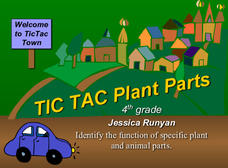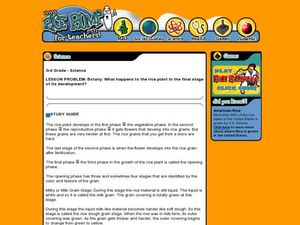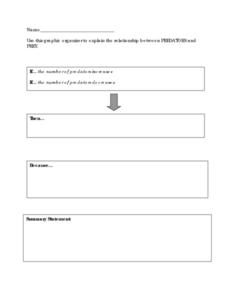Curated OER
Seed Structure and Seed Dispersal
Third graders plant seeds. In this seed structure lesson plan, 3rd graders identify parts of a seed and plant a lima bean seed. Students discuss and reflect on the process in their journals.
Curated OER
Seed Diversity
Students explore agriculture by researching different seeds. In this seed identification activity, students collaborate in small groups to analyze a package of different seeds. Students utilize a magnifying glass to examine each seed...
Curated OER
What Bees Eat
Students study plant and animal interdependence by studying bees and pollination. In this interdependence lesson, students discuss flower parts and dissect it to show its reproductive parts. Students then use tissue and pipe cleaners to...
Curated OER
Plant Diversity
For this nonfiction comprehension worksheet, students read the selection on plant diversity and answer 10 questions that include true/false, short answer, multiple choice, and fill in the blank.
Curated OER
Vegetative Propagation Project
Young scholars, in this project, successfully start new plants by various means of vegetative propagation.
Curated OER
Botany: Rice Plant - Second Phase
Third graders make drawings that show the growth of the rice plant in the reproductive phase. In this rice plant lesson plan, 3rd graders read about the second phase of the rice plant, and then draw pictures and label them.
Curated OER
If It Smells Good, Is Edible, and Attracts Wildlife, Then It's a Practical Garden
Students explore landscape design. In this practical gardening lesson, students design landscape plans that call for shrubs, trees, and plants that can be used for aesthetics, cooking, and wildlife.
Curated OER
Tic Tac Plant Parts
This plant biology PowerPoint introduces plant parts and their functions. This PowerPoint allows students to identify each plant part on a diagram, along with its' function. The slides contain a clear explanation of how each plant part...
Curated OER
Botany: Rice Plant Development
Students determine what occurs in the final stages of the development of a rice plant. In this rice plant development lesson, students use the associated study guide to list the three stages in the ripening phase of rice development....
Curated OER
Pollen Collection And Identification
High schoolers investigate plant reproduction, pollen collection and identification. They collect pollen samples over a twenty four hour period and examine them under a microscope.
Virginia Department of Education
Animal Phyla and Plant Divisions
Searched hours for an activity that allows individuals the ability to use multiple resources to learn about both plant and animal kingdoms? This discussion and activity provide pupils with the ability to visualize each organism...
Curated OER
Drugs and Safety Precautions
Drugs can both help and harm depending on how they are used. Fifth graders complete a worksheet that provides background information on prescription drugs. They read the text and then describe why medication manufacturers label pill...
Curated OER
Fungi
Lovely pictures help to summarize the different characteristics of fungi in this PowerPoint which covers structure, function and the way that fungi get nutrients. Symbiotic relationships are examined, and some commercial uses are...
Curated OER
Seed Dispersal
Young scholars explore seed dispersal by designing their own wind dispersed seed structure. Using one piece of paper and a box fan, they construct a seed dispersal structure, record the distance their seed travels, and answer discussion...
Curated OER
Plant Structure and Growth
This plant structure and function PowerPoint addresses the main organs and the factors that affect its development as well as going into detail about the specializations at a cellular level. The cell functions and system...
Curated OER
Window Gardens
Students use a plastic sandwich bag containing a damp paper towel taped to a window as a model system to observe the germination and early growth of radish seeds. They are challenged to pose a question about seed germination and growth...
Curated OER
Genetics
Students explain the difference between dominant and recessive genes, identify what causes differences in the traits of parents and their offspring, and explain how sex is determined. They will also improve their reading and...
Curated OER
Parts of the Seed
In this biology worksheet, students read about the parts of plant seeds and look at a seed diagram. They read about the roots, endosperm, embryo, and the process of germination. They answer 8 online multiple choice questions based on the...
Curated OER
Insects!
Young scholars explore the diet of insects. In this "insects" biology lesson, students take a nature walk and collect various natural materials they think may be eaten by insects. Young scholars sort and classify these materials into...
Curated OER
Mitosis and Meiosis
Students model and differentiate between the processes of mitosis and meiosis. In partners, they use yarn and construction paper to create models for each of the phases of mitosis and meiosis then compare the chromosome numbers in each...
Curated OER
COMMON KINDS OF INSECTS
Students will recognize and name three common insects.1. Share background information with students. 2. Provide students with the "bug body" puzzle pages, and have them cut the puzzles out.1. Share background information with students....
Curated OER
Predators and Prey
Students explain how the food chain works. They contrast predators with prey and describe their function in nature. Students discuss how the food chain aids in keeping nature balanced. In small groups, they play a game that simulates the...
Curated OER
Books for Teaching About Colors
Students explore colors through books. In this instructional activity students read books about colors. The instructional activity is divided by color and within each color there is a list of books about that color. Moreover each color...
Curated OER
Punnett Squares/Genetics
Ninth graders complete a monohybrid cross and a dihybrid cross. In this biology lesson, 9th graders predict the traits of offspring using the Punnett square. They differentiate recessive and dominant genes.

























